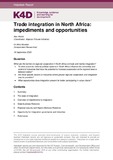| dc.contributor.author | Walsh, Alex | |
| dc.contributor.author | Boustati, Alma | |
| dc.coverage.spatial | North Africa | en |
| dc.date.accessioned | 2020-11-13T15:40:32Z | |
| dc.date.available | 2020-11-13T15:40:32Z | |
| dc.date.issued | 2020-09-18 | |
| dc.identifier.citation | Walsh, Alex and Boustati, Alma. (2020) Trade Integration in North Africa: Impediments and Opportunities. K4D Helpdesk Report. Brighton, UK: Institute of Development Studies. | en |
| dc.identifier.uri | https://opendocs.ids.ac.uk/opendocs/handle/20.500.12413/15775 | |
| dc.description.abstract | This review synthesises evidence on the barriers to regional cooperation in North Africa on trade and market integration. This review focuses on impediments to trade integration, taking a deeper dive on the effects of state-business relations and the Algeria-Morocco relationship. It concludes by relaying some possibilities for integration in terms of governance and industries. North Africa has the lowest level of regional trade integration in the world with significant lost opportunity in terms of trade growth. Reasons for this poor performance are plentiful, covering tariff and non-tariff measures, poor infrastructure, intra and inter-state conflicts, diverging political economies and state-business relations, and the ‘hub and spoke’ trade arrangement that prioritises trade with Europe. The literature identified for this review is current, with most sources from 2016 until the present. It is strongest in identifying impediments to integration. It is weaker on the real-world effects of business-state relations, even while it presents a good theoretical framework. The literature makes a clear explanation for the state of Algeria-Morocco relations and how it impedes integration. It is somewhat better in terms of identifying opportunities for integration. In terms of geographical coverage, the Maghreb countries are best addressed compared to the region as a whole; questions around Libyan integration into the region are not well treated and may be occluded by the issues connected to the ongoing conflict. Quality of evidence is mixed; empirical studies rely heavily on imperfect or limited data and qualitative studies vary in their level of nuance and relevance. | en |
| dc.description.sponsorship | FCDO (Foreign, Commonwealth and Development Office) | en |
| dc.language.iso | en | en |
| dc.publisher | Institute of Development Studies | en |
| dc.relation.ispartofseries | K4D Helpdesk Report;888 | |
| dc.rights.uri | https://www.nationalarchives.gov.uk/doc/open-government-licence/version/3/ | en |
| dc.subject | Economic Development | en |
| dc.subject | Governance | en |
| dc.subject | Trade | en |
| dc.title | Trade Integration in North Africa: Impediments and Opportunities | en |
| dc.type | Helpdesk | en |
| dc.rights.holder | © Crown copyright 2020 | en |
| dcterms.dateAccepted | 2020-09-18 | |
| rioxxterms.funder | Default funder | en |
| rioxxterms.funder | Department for International Development, UK Government | en |
| rioxxterms.identifier.project | Default project | en |
| rioxxterms.identifier.project | K4D | en |
| rioxxterms.version | VoR | en |
| rioxxterms.funder.project | 9ce4e4dc-26e9-4d78-96e9-15e4dcac0642 | en |
| rioxxterms.funder.project | 238a9fa4-fe4a-4380-996b-995f33607ba0 | en |

